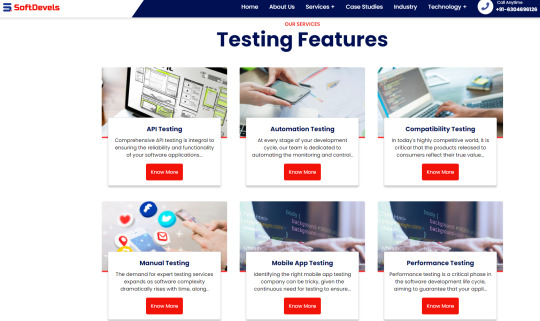#AgileTesting
Video
Agile Testing Case Study: Improving Product Quality and Customer Satisfa...
2 notes
·
View notes
Text
Importance Of Software Testing In Agile Software Development

In Agile software development, software testing is not a standalone phase but an integrated and continuous process. Its importance stems from the need for fast iterations, improved collaboration, and delivering a high-quality product in a dynamic environment. Here’s why software testing is crucial in Agile:
1. Ensures Continuous Quality
Agile promotes frequent iterations, requiring rapid development cycles. Testing ensures that new code integrates smoothly with existing functionality, helping maintain quality throughout development. Continuous integration (CI) and testing frameworks like Jenkins or CircleCI are often employed to automate this process, ensuring quality remains intact in each iteration.
2. Supports Early Detection of Issues
Testing in Agile begins as soon as the development starts, following the "Test-Driven Development (TDD)" approach. Developers write tests before the code, ensuring that errors are caught early in the development cycle. This minimizes the cost of fixing bugs, as it’s easier to address problems before they become deeply embedded in the system.
3. Promotes Collaboration Between Teams
In Agile, cross-functional teams work together, including developers, testers, and business analysts. Continuous testing facilitates collaboration by ensuring that feedback loops are short. Testers become a key part of daily stand-ups and sprint planning, aligning their testing strategies with development goals. This collaboration boosts communication, ensuring that everyone is on the same page regarding feature delivery and quality.
4. Facilitates Rapid Delivery
Agile emphasizes speed without compromising quality. Automated testing plays a pivotal role here, enabling quick validation of new features or bug fixes. By continuously testing the code base, the risk of breaking existing functionality is minimized, ensuring that teams can confidently release software faster.
5. Adapts to Changing Requirements
The iterative nature of Agile accommodates evolving customer needs. Software testing ensures that new requirements are integrated into the system without destabilizing the existing functionalities. Regression testing, particularly automated, becomes vital to verify that new features don't introduce bugs.
Conclusion
In Agile development, software testing is not just a phase but an ongoing process. It ensures continuous quality, speeds up delivery, fosters collaboration, and adapts to changes efficiently. Agile’s success hinges on effective and integrated testing practices, making it a cornerstone of modern software development.
Read more: https://nectarbits.ca/blog/importance-of-software-testing-in-agile-software-development
0 notes
Text

Testing methodologies guide the process of evaluating software quality. They include Agile, Waterfall, Continuous Testing, TDD, and BDD, each offering distinct approaches for effective testing.
1 note
·
View note
Text
#softwaretesting#Cypress#Jenkins#CI_CD#AutomationFramework#TestAutomation#DevOps#SoftwareTesting#CypressTesting#AutomationTools#TestingFramework#ContinuousIntegration#ContinuousDelivery#AgileTesting#QA#QualityAssurance#AutomationEngineer#DevOpsEngineer#CICDTools#TechBlog#TestingTools#SDET#QAEngineer
0 notes
Text
https://www.impactqa.com/blog/agile-testing-best-practices-and-methodology/
0 notes
Text
Complete Resource for Free QA Training and Placement
Are you ready to fulfilling career journey in Quality Assurance (QA) but unsure where to start? Look no further! Dive into the comprehensive world of Free QA Training and Placement opportunities with our all-inclusive guide. Whether you're a seasoned professional seeking to sharpen your skills or a newcomer eager to break into the industry, we've got you covered. Let's explore how you can leverage this complete resource to launch your QA career to new heights.
Why QA : Ensuring Quality in Every Product
Software Quality Assurance Testing Training is the cornerstone of product development across various industries. From Software applications to manufacturing processes, QA ensures that products meet stringent quality standards and deliver exceptional user experiences. By mastering QA principles and techniques, you become an invaluable asset to any organization striving for excellence.
The Journey Begins: Free QA Training
Online Courses: Access a plethora of free online courses covering fundamental and advanced QA concepts. Platforms like Coursera, edX, and Udemy offer courses taught by industry experts, allowing you to learn at your own pace.
YouTube Tutorials: Dive into YouTube's vast repository of QA tutorials and lectures. From test automation to manual testing methodologies, you'll find an abundance of valuable resources to enhance your skills.
Open Source Tools: Embrace the power of open-source QA tools such as Selenium, JUnit, and Appium. Join online communities and forums dedicated to these tools to learn best practices and troubleshooting techniques.
Job Market: Placement Assistance
Resume Building: Craft a compelling resume that highlights your QA skills and experiences. Utilize free resume-building resources and templates available online to create a professional document that stands out to recruiters.
Mock Interviews: Practice mock interviews to hone your communication and problem-solving abilities. Seek feedback from mentors or join online communities where professionals offer mock interview sessions to help you prepare for real-world scenarios.
Job Portals and Networking: Explore job portals like Indeed, Glassdoor, and LinkedIn for QA job openings. Network with industry professionals through LinkedIn groups and forums to discover hidden job opportunities and gain insights into the QA field.
Additional Tips and Resources
Continuous Learning: Stay updated with the latest trends and advancements in QA by following industry blogs, attending webinars, and participating in online discussions. Lifelong learning is key to staying relevant in the ever-evolving QA landscape.
Certifications: Consider pursuing certifications such as ISTQB (International Software Testing Qualifications Board) to validate your QA expertise. Many certification bodies offer free study materials and practice exams to help you prepare for certification exams.
Soft Skills Development: Cultivate essential soft skills such as communication, teamwork, and time management. These skills are equally important in QA roles, enabling you to collaborate effectively with cross-functional teams and deliver quality results.
Unlock the door to endless opportunities with our complete resource for free QA training and placement. Whether you're aiming to land your dream job or advance your career, seize the chance to become a QA powerhouse today!

#DiversityInTech#InclusiveQA#Mentorship#FutureOfQA#AIinQA#IoTTesting#DevOps#AgileTesting#QAInnovation#QACommunity#free qa training#placement#qa training and placement#qa
0 notes
Text

Elevate your career in QA Automation Testing with our comprehensive training program! Gain hands-on experience in industry-leading tools and frameworks, led by expert instructors. Flexible learning options available. Enroll now and unlock your potential!
Enroll now:
Mock Interviews
Resume Preparation
100% Job Assistance
WhatsApp: https://wa.me/17324852499
#QA#AutomationTesting#SoftwareTesting#TestAutomation#QualityAssurance#Selenium#TestAutomationFramework#ContinuousIntegration#DevOpsTesting#AgileTesting
0 notes
Text

Are you an accomplished leader in Testing? We are seeking a Test COE Lead to drive excellence in testing practices and strategies.
Bring your expertise to our team and lead the way towards quality assurance excellence.
Apply now!
Job Description - https://bizessence.com.au/jobs/test-coe-lead/
#bizessence#testcoe#qualityassurance#testautomation#testinglead#softwaretesting#qalead#testmanagement#automationtesting#agiletesting#testingexcellence#testleadership#qaexpert#teststrategy#jobopening#techjobs#careeropportunity#hiring#hiringnow#nowhiring
0 notes
Text

SDET Technologies team is committed to delivering excellence in Software Testing through our test automation expertise. Visit:https://rb.gy/bqwuq0
#mobile testing#globalization testing services#software testing services in india#functional testing#globalization testing#globalization testing company#agiletesting
0 notes
Text
If you want to learn software testing courses online, you can join the Croma Campus which provides basic to advanced-level software testing training at an affordable fee. It provides the latest and updated training course modules created by 12+ years of experienced mentors.
0 notes
Text
Top 10 DevOps Trends in 2024
In the ever-evolving landscape of DevOps, staying ahead of the curve is essential for organizations aiming to enhance collaboration, accelerate development, and ensure continuous delivery. As we look forward to 2024, several trends are shaping the future of DevOps. Let’s explore the top 10 DevOps trends that are expected to dominate the scene in the coming year.
AI and Machine Learning Integration
DevOps is set to embrace AI and machine learning to optimize processes further. Expect intelligent automation, predictive analytics, and anomaly detection to become integral parts of the DevOps toolchain, enhancing efficiency and decision-making.
GitOps Adoption
GitOps, an operational model that leverages Git for declarative infrastructure and application management, is gaining traction. This trend is expected to continue in 2024, providing teams with a unified approach to version control and infrastructure as code.
Security-Driven DevOps (DevSecOps)
With the increasing frequency and sophistication of cyber threats, security is becoming an integral part of DevOps. DevSecOps practices will be a focal point, integrating security measures at every stage of the development pipeline.
Serverless Computing in DevOps
Serverless architecture is set to revolutionize how applications are developed and deployed. In 2024, DevOps teams will explore serverless computing to enhance scalability, reduce infrastructure management overhead, and optimize resource utilization.
Kubernetes as a Standard
Kubernetes has become the de facto standard for container orchestration. In 2024, its role in DevOps will continue to expand, with more organizations adopting Kubernetes for seamless container deployment, scaling, and management.
Multi-Cloud Strategies
Embracing a multi-cloud approach will be crucial for DevOps teams seeking flexibility and resilience. The trend in 2024 will involve optimizing workflows for multiple cloud providers, ensuring efficient resource utilization and avoiding vendor lock-in.
Edge Computing Integration
As edge computing gains prominence, DevOps practices will adapt to support applications deployed at the edge. Expect to see the incorporation of edge computing considerations into CI/CD pipelines and infrastructure management strategies.
Enhanced Observability
Comprehensive observability across the entire software delivery pipeline will be a priority. DevOps teams will invest in advanced monitoring, logging, and tracing solutions to gain insights into application performance, user experience, and infrastructure health.
ChatOps for Collaboration
ChatOps, which integrates chat platforms with DevOps tools, will continue to facilitate real-time collaboration among team members. In 2024, expect increased adoption of ChatOps for streamlined communication, issue resolution, and knowledge sharing.
No-Code/Low-Code DevOps
The rise of no-code/low-code platforms is extending into the DevOps domain. In 2024, these platforms will empower non-developers to participate in the DevOps process, accelerating the delivery of applications and reducing the development bottleneck.
#magistersign#onlinetraining#softwarecompany#agiletesting#technology#developer#career#softwaresolutions#softwareengineers#java#jobsearch#softwaredevelopers#devops
0 notes
Text
Introducing Our Latest Whitepaper: Managed Testing Services: An Overview
In an era where a single glitch can cost millions and harm customer trust, the need for rigorous testing of software and mobile apps is more critical than ever.
Discover how Managed Testing provides a comprehensive solution to overcome the evolving challenges in IT.
From IT modernization to specialized testing environments, our whitepaper covers it all.
Download now: https://www.avisysservices.com/whitepaper/managed-testing-services-whitepaper/

#SoftwareQuality#InnovationInTesting#Whitepaper#ManagedTestingServices#QualityAssurance#SoftwareTesting#DigitalTransformation#TestingCoE#DevOps#AutomationTesting#PerformanceTesting#ITOutsourcing#CyberSecurity#AgileTesting#CloudTesting#UserExperience#SaaS#TechTrends#BusinessIntelligence#CustomerExperience#CX#UX
0 notes
Text
Importance Of Software Testing In Agile Software Development

In the fast-paced world of Agile software development, incorporating software testing services is vital for reducing errors, improving product quality, and speeding up time-to-market. From automated software testing services to benchmark software testing, these practices ensure that your software remains robust, secure, and reliable.
Read more: https://nectarbits.ca/blog/importance-of-software-testing-in-agile-software-development
0 notes
Text

Join our SCCP certification program in software testing and kickstart your career. Learn the craft of testing and quality assurance.
Enrolling in software testing courses provides individuals with the necessary skills and procedures to ensure the quality and functionality of software applications, providing the foundation for a successful career in software testing. India +91 8921873781, UA: +1 (267)5909343,Canada:+1 (437)229-8672. Email: [email protected]
#softwaretesting#testing#qa#softwaredevelopment#software#automationtesting#softwaredeveloper#softwareengineer#qualityassurance#manualtesting#testautomation#softwaretester#softwareengineering#qaengineer#testers#programming#selenium#jobs#softwarecompany#agiletesting#technology#developer#career#softwaresolutions#softwareengineers#java#jobsearch#softwaredevelopers#devops#qajobs
0 notes
Text

Dive into the world of testing excellence! 🌐✨ SoftDevels unveils new features that redefine the testing landscape. 🚀 Whether it's manual precision or automated brilliance, we're elevating software quality.
www.softdevels.com
#SoftwareTesting#TestingSolutions#QAExcellence#DigitalQuality#InnovationInTesting#TechInnovation#QualityMatters#TestingTools#TestAutomation#SoftwareQuality#TechUpdates#DigitalTransformation#AgileTesting#CuttingEdgeTech#QAandTesting#DigitalInnovation#SoftDevelsInnovates#FutureTech#TestEngineering#DigitalExcellence#TechTrends
0 notes
Text

Staying flexible and efficient is the key to succeeding in today’s competitive business landscape. Integrating Agile Testing practices can help facilitate this vision and effectively cope with the varying requirements for an accelerated and high-quality product delivery. Agility in testing drives enhanced collaboration, faster time-to-market, and improved customer satisfaction.
Read this blog authored by Yogeesh K., Associate Director-QE, and co-authored by Vani Valentina, Consulting Lead at Applexus to learn how Agile Testing’s 12 fundamental principles shape the software development process and help prioritize and address the shifting priorities in this ever-evolving landscape.
Read more at https://www.applexus.com/blogs/agile-testing-in-software-development
1 note
·
View note